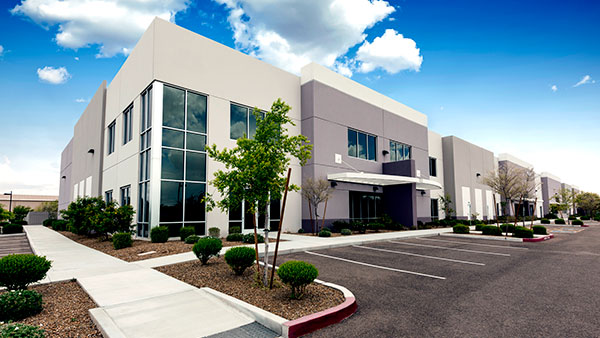
Prepare your commercial property for warmer weather by attending to a checklist of items inside and out.
We all think of spring cleaning for our homes, both inside and outside, but have you thought about getting your commercial building ready for warmer weather? Let’s review a few key items that may prevent costly repairs and allow you to enjoy the change in seasons without worrying about the condition of your property.
FIRE PROTECTION
Warm weather months are the best time to complete your sprinkler system inspection, testing and maintenance. Flowing water to exterior drains this time of year won’t cause water to freeze and create slippery conditions. While scheduling this service, also consider:
- Inspecting, testing and maintaining your fire detection system
- Inspecting portable fire extinguishers
- Checking operation of all emergency lighting units
- Making sure exit signs are illuminated
- Changing batteries in smoke and carbon monoxide units if they are not wired to the building’s electric service
Contractors should follow requirements outlined by the National Fire Protection Association, specifically: NFPA 25 Standard for the Inspection, Testing, and Maintenance of Water-Based Fire Protection Systems (2020), NFPA 72 National Fire Alarm and Signaling Code (2019), NFPA 10 Standard for Portable Fire Extinguishers (2018) and NFPA 101 Life Safety Code (2021).
ROOF
With the winter winds, snow and ice buildup, spring is the best time to inspect your building’s roof.
- Check the entire surface for any apparent damage, loose seams or areas of water accumulation (puddling)
- Check to make sure roof drains are clear of any debris
- Make sure drainpipes are properly secured and not damaged
- Remove any debris from roof covering, especially leaves or plant materials
- Inspect rooftop equipment for any noticeable damage
- Check roof penetrations to ensure they are properly sealed
You’ll want to schedule repairs as soon as possible because as we get closer to good weather months, contractors’ schedules will fill quickly, meaning you may face delays or increased costs.
BUILDING MECHANICALS
As the temperature warms, you will be able to shut down your heating system. This is the best time to bring in a heating and air conditioning contractor.
- Make sure systems have been properly shut down
- Arrange to have the system properly cleaned, if necessary, and prepared for the next heating season
- Check your inventory of filters
- Inspect the cooling systems to ensure proper operation
- Replace any required filters if not done from prior season
If you drained your plumbing for the winter, take these steps before turning the water back on:
- Visually inspect exposed piping for suspected damage, especially pipes on outside walls
- Close all faucets inside and outside, including any supply line shut-off valves
- Open main valve of water service slowly
- Check exposed pipes throughout the building for any leakage; you may need some helpers
- Open supply line shut offs individually and then each fixture
Plumbing leaks can lead to expensive repairs or even damage to items that can’t be replaced. To minimize potential water damage from leaking pipes, consider having a plumbing contractor install an automatic water shut-off device. With many options available, your plumbing professional will be able to offer a solution that fits your budget.
EXTERIOR AREAS – WALKING AND PARKING AREAS
April showers will bring May flowers as well as plenty of mud and sloppy conditions.
- Prepare to have enough weather matting available to control interior floor conditions
- Remind your staff about floor cleaning procedures
- Reinforce the need for proper placement of warning signs
Spring is time to make sure your walking and parking surfaces were not damaged from winter’s snow, ice, frost and salting.
- Walk the property and identify all affected areas
- Mark clearly or protect those areas to minimize any potential that employees and visitors could trip and fall
- Coordinate with a qualified contractor to further assess conditions and complete repairs
Remember, scheduling with contractors early in the season is best to avoid delays.
LANDSCAPING
Spring is a good time to prepare your entire landscape for the season
- Check your irrigation systems for any damage, leakage and proper function
- Make sure the timers are set for early morning or evening, generally good times for watering
- Test the system to ensure spray patterns are appropriate
- Prune trees, shrubs and plants to help keep their shape and avoid overgrowth
- Remove excess vegetation to help overall growth and health
- Clear out old landscape material, replacing weed control material as needed
When hiring contractors, always confirm they have adequate insurance coverage. Request a certificate of insurance. Establish contractual agreements that include necessary insurance requirements and risk transfer language. Contact your independent insurance agent to assist; as your business partner, they will be able to provide guidance.
This loss control information is advisory only. The author assumes no responsibility for management or control of loss control activities. Not all exposures are identified in this article. Contact your local, independent insurance agent for coverage advice and policy service.
